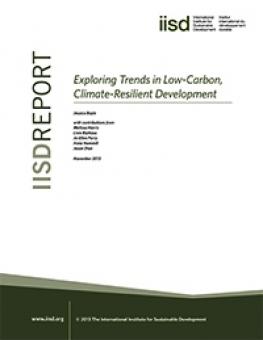
Exploring Trends in Low-Carbon, Climate-Resilient Development
In recent years, the concept of low-carbon, climate-resilient development (LCCRD) has emerged as a key way of framing policy and action to address climate change, capturing the need for mitigation and adaptation efforts to be fully integrated into development planning and implementation.
This policy paper aims to better understand current shifts towards LCCRD and the trends that are shaping this evolution. It begins by identifying key principles and elements that contribute to current understandings of LCCRD at both the theoretical and practical levels. It then identifies two key drivers— governance and finance—that further define the broad context from which many of these LCCRD strategies are emerging. Finally, the paper analyzes several specific trends in key areas that are influencing LCCRD development, including Nationally Appropriate Mitigation Actions (NAMAs), adaptation monitoring and evaluation, and online knowledge brokering.
You might also be interested in
COP 29 Outcome Moves Needle on Finance
In the last hours of negotiations, concerted pressure from the most vulnerable developing countries resulted in an improved outcome on the finance target, with a decision to set a goal of at least USD 300 billion per year by 2035 for developing countries to advance their climate action.
November 2024 | Carbon Minefields Oil and Gas Exploration Monitor
In October 2024, 20 oil and gas exploration licences were awarded across three countries, with a significant portion granted by Brazil.
Coalition against fossil fuel subsidies expands but misses initial targets
The UK, Colombia, and New Zealand have signed on to a coalition of governments aiming to phase out fossil fuel subsidies, joining 13 other mainly European nations in the alliance. IISD's Vance Culbert said that half a dozen more countries—including "a few larger economy developing countries"—are talking privately to them about joining too.
Europe’s Dash for Gas in Africa puts Private Profits First
Europe’s demand for gas is contributing to expansion of LNG projects in Mozambique, Nigeria, and Senegal. This favours the interests of European oil and gas companies over those of African countries, a new report shows.